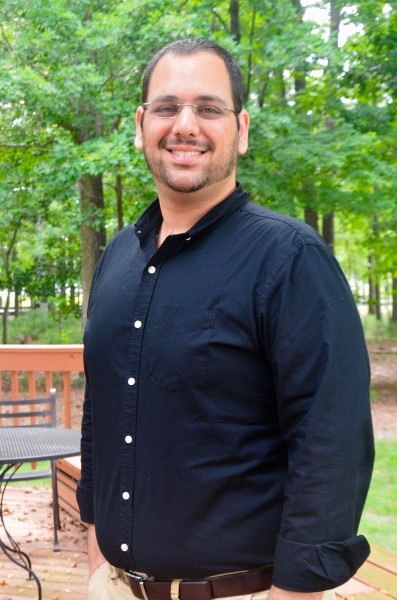Aug 18 2016
Or Hen spent six years studying how protons and neutrons interact inside the nucleus of the atom at the Thomas Jefferson National Accelerator Facility. Now, he’s been awarded the 2015 Jefferson Science Associates Thesis Prize for the thesis he wrote about the research.
 Or Hen has been awarded the 2015 Jefferson Science Associates Thesis Prize for his written thesis featuring research on how protons and neutrons interact inside the nucleus of the atom at the Thomas Jefferson National Accelerator Facility. (Credit: DOE's Jefferson Lab)
Or Hen has been awarded the 2015 Jefferson Science Associates Thesis Prize for his written thesis featuring research on how protons and neutrons interact inside the nucleus of the atom at the Thomas Jefferson National Accelerator Facility. (Credit: DOE's Jefferson Lab)
Hen studies protons and neutrons, collectively called nucleons. Specifically, he’s interested in those nucleons that interact with each other via short-range correlations.
“The purpose of my research is to try to understand the phenomenon in nuclei where nucleons form a short-range correlated state. This state gives them very high momentum, so they move very, very fast inside the nucleus,” Hen explained. “We study this phenomenon to try to understand how it affects the properties of nucleons and to determine what we can learn about the fundamental aspects of nuclear structure and other related systems, like neutron stars.”
In his thesis, Hen discusses new findings that he and his colleagues revealed during the research effort, reviews the implications of these results for real-world systems, and proposes the next generation of experiments. Hen wrote the thesis, titled “High-Momentum Nucleons in Nuclei,” while pursuing his Ph.D. at Tel Aviv University under the supervision of Professor Eli Piasetzky.
The JSA Thesis Prize is awarded annually for the best Ph.D. student thesis on research related to Jefferson Lab science and includes a $2,500 cash award and a commemorative plaque. Nominations for the JSA Thesis prize are judged on four criteria: the quality of the written work, the student's contribution to the research, the work's impact on the field of physics, and service (how the work benefits Jefferson Lab or other experiments).
In addition, the recipient presents his or her work during a session at the Jefferson Lab Users Group’s annual meeting. Users are the scientists, from across the U.S. and from 29 countries, who conduct fundamental nuclear physics experiments with Jefferson Lab’s research facilities and capabilities. The Users Group Board of Directors oversees the winner selection process.
“We were extremely thrilled by the large number of high-quality theses nominated for the thesis prize this year, which presented an extremely challenging job to select the final winner. It is also gratifying to see high-quality theses that represent some of the most exciting physics results continuing to come out of the Jefferson Lab 6 GeV era,” said Haiyan Gao, 2015-2016 chair of the Jefferson Lab Users Group Board of Directors and Henry Newson Professor at Duke University, as well as Vice Chancellor for Academic Affairs at Duke Kunshan University in China.
To expand the opportunity for discovery, Jefferson Lab is upgrading its facility by doubling the energy of its accelerator's electron beam from 6 billion electron volts (GeV) to 12 GeV, constructing a new experimental hall and upgrading its existing experimental halls. Hen said that he’s honored by the prize and is looking forward to continuing his research using Jefferson Lab’s upgraded capabilities.
“It’s really nice. Getting your Ph.D. is a hard thing to do. It took six years of very hard work, and I want to thank my collaborators, particularly Larry Weinstein at Old Dominion University and Douglas Higinbotham at Jefferson Lab,” Hen said. “Given the large variety of excellent research being done at Jefferson Lab, it’s nice that a committee of lab scientists and users think that my work is good enough to get an award.”
Hen’s hard work has already paid off in other ways. He received his Ph.D. in nuclear and particle physics from Tel Aviv University in 2015. He is now a Pappalardo Fellow in Physics at MIT (2015-2018), a Rothschild Fellow and a Fermilab Intensity Frontier Fellow. He plans to start his own research group and further develop a research program focused on short-range correlations and how they can reveal new information about the ubiquitous protons and neutrons in our universe.
The JSA Thesis Prize was established in 1999 by the Southeastern Universities Research Association and is now one of many projects supported by the JSA Initiatives Fund Program, which was established by Jefferson Science Associates to support programs, initiatives and activities that further the scientific outreach, and promote the science, education and technology missions of Jefferson Lab in ways that complement its basic and applied research focus. Initiatives Fund awards are for those projects that benefit the lab user community and that leverage commitments of others.
Jefferson Science Associates, LLC, a joint venture of the Southeastern Universities Research Association, Inc. and PAE, manages and operates the Thomas Jefferson National Accelerator Facility for the U.S. Department of Energy's Office of Science.
DOE’s Office of Science is the single largest supporter of basic research in the physical sciences in the United States, and is working to address some of the most pressing challenges of our time. For more information, visit science.energy.gov.